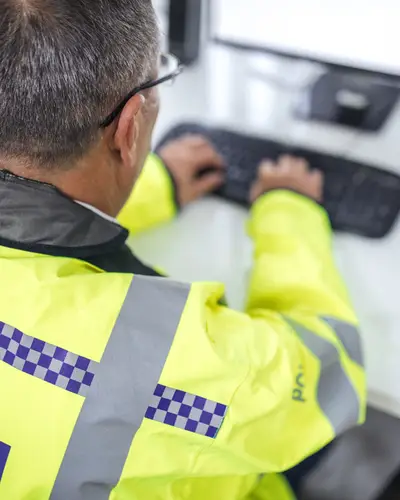Translating multidisciplinary research to support policy and practice that advances justice, safety, and resilience.
We study strategies designed to prevent and respond to crime and victimization, and support adoption of effective, efficient, and fair solutions that promote justice, safety and well-being. Our work examines the operations and impact of organizations in the public and private sector that include victim service providers, first responders, law enforcement, forensic laboratories, courts, corrections, and community-based organizations focused on justice and resilience.
RTI’s experts conduct research, evaluation, quality assurance, training, and technical assistance designed to translate evidence into actionable strategies for communities and public systems. These capabilities and associated examples of RTI’s work include:
Evaluations of community-based prevention, safety and wellness programs
RTI designs and implements evaluation and knowledge translation projects on school safety and student resilience, such as the National Assessment of School Safety Tip Lines. This National Institute of Justice-funded study generated a National Portrait of Tip Line Use in schools, assessed whether the adoption of a tip line is associated with improvements in school safety, and conducted a case study of the implementation of the SafeOregon school safety tip line.
RTI evaluates strategies to support individuals who work in safety and justice agencies. For example, RTI is conducting a two-part study to examine medicolegal investigators’ experiences of work-related stress, trauma, and organizational supports through a national survey. We are also implementing a mixed-methods impact study to test the effectiveness of a mindfulness intervention to reduce the effects of work-related stress and trauma on this workforce.
RTI leads the multi-site evaluation to assess the effectiveness of the Project Safe Neighborhoods program. This Department of Justice-sponsored initiative involves cooperation of multiple criminal justice agencies and their partners working at the local level to develop and implement strategic responses to reduce violent crime, with specific emphasis on gun crime. Project Safe Neighborhoods is part of the US Department of Justice’s comprehensive violent crime reduction strategy
National data collections and surveillance studies
RTI supports the Bureau of Justice Statistics’ mission to produce high quality statistical indicators of the criminal justice system by conducting national studies of the operations of law enforcement agencies, medical examiner and coroner’s offices, prosecutor offices, and probation and parole agencies, as well as inmate surveys.
RTI has been contracted to develop and administer the National Forensic Laboratory Information System (NFLIS) since 1997. This database includes results of drug analyses conducted by nearly 300 state and local forensic laboratories, representing approximately 1.5 million drug reports each year. Substances analyzed reflect drug evidence secured by law enforcement operations nationwide.
Studies that explore the impact of justice system involvement
The Multi-site Family Study on Incarceration, Parenting and Partnering evaluated federally-funded family strengthening programs for incarcerated and reentering fathers and their partners. The study followed roughly 1,500 couples for up to three years, beginning during the male partner’s incarceration and typically continuing through his reentry into the community.
RTI conducted a cross-site evaluation of 12 demonstration sites funded through the Supporting Male Survivors of Violence Initiative. This initiative seeks to build on the awareness that existing systems and service providers do not have the cultural competency and capacity to effectively treat male survivors of violence.
Implementation of quality standards for public safety and laboratory agencies
The RTI Center for Forensic Sciences’ laboratory quality assurance program assesses, supports, and improves the quality of drug testing laboratories and criminal justice organizations in the United States and abroad. Our services develop and manage proficiency testing programs and forensic laboratory inspections as well as the design, preparation, and distribution of reference materials and quality assurance samples for clinical and forensic drug testing laboratories
Technological innovation to support public safety agencies and forensic laboratories
The Forensic Technology Center of Excellence (FTCoE) seeks to strengthen the impact of forensic science through rigorous technology corroboration, evaluation, and adoption. Our team brings to this role expertise across all forensic disciplines, complemented by a robust infrastructure that includes laboratory sciences, criminal justice operations, web-based training, data collection, and technology assessment.
RTI conducts the Criminal Justice Testing and Evaluation Consortium, a program of the National Institute of Justice, which uses research-based methodologies to enhance the capabilities of law enforcement, courts, and corrections agencies. This consortium leverages expertise from varied criminal justice community stakeholders to understand and evaluate technologies and practices in a variety of research areas.
Studies of justice reform and adaptation
Through the Advancing Pretrial Policy and Research initiative, RTI leads research to locally validate and identify improvements to the Public Safety Assessment, a tool that assists court actors in making pretrial release decisions. The research team also partners with jurisdictions to assess their local pretrial system and make data-informed policy and practice changes to improve the administration of justice during this predisposition stage of case processing.
RTI conducted a rapid assessment of victim service providers across North Carolina during the COVID-19 pandemic to understand the challenges they faced in continuing their service delivery and the strategies they utilized to overcome those challenges to remain available and responsive to clients’ needs. Findings from this project are designed to enhance community and policymaker understanding of the presenting needs of victim service providers, provide tangible measures to support the necessary adaptation efforts of these agencies, and provide a framework for supporting victim service provision during other socially disruptive crises.
Training and technical assistance to respond to critical justice issues
RTI conducts the Sexual Assault Kit Initiative Training and Technical Assistance Program, which supports coordinated teams of police officers, prosecutors, crime laboratory professionals, sexual assault nurse examiners, forensic medical personnel, and victim services agency members. The program provides victim-centered and sustainable practices that help with collecting and processing forensic evidence, investigating and prosecuting sexual assault cases, and supporting sexual assault survivors.
RTI designed the Outcomes for Human Trafficking Survivors evaluation instrument, incorporating input from practitioners, survivors, and researchers at each step in the process. Designed to be completed by service providers about the clients they serve, the instrument measures client status in four key areas: safety, well-being, social connectedness, and self-sufficiency.
RTI leads the Comprehensive Opioid Abuse Program Training and Technical Assistance initiative, which provides direct support to state agencies and subrecipients, making communities safer by promoting evidence-based practices to respond to the opioid epidemic across all government levels. Through its substantive, methodological, and technical assistance expertise, RTI and its partners foster peer-to-peer learning and cross-site coordination to enable discussions of lessons learned, facilitate program improvements, and promote evidence-based program proliferation, providing tailored training and technical assistance for the unique needs of jurisdictions that can also be applied nationally.
Focus Areas
Trauma-Informed Research Methods: A Podcast for Justice Professionals
Related Projects
Evaluating a Victim-Centered Approach to Policing Intimate Partner Violence
Read More about Evaluating a Victim-Centered Approach to Policing Intimate Partner Violence




























